- Home
- Medical news & Guidelines
- Anesthesiology
- Cardiology and CTVS
- Critical Care
- Dentistry
- Dermatology
- Diabetes and Endocrinology
- ENT
- Gastroenterology
- Medicine
- Nephrology
- Neurology
- Obstretics-Gynaecology
- Oncology
- Ophthalmology
- Orthopaedics
- Pediatrics-Neonatology
- Psychiatry
- Pulmonology
- Radiology
- Surgery
- Urology
- Laboratory Medicine
- Diet
- Nursing
- Paramedical
- Physiotherapy
- Health news
- Fact Check
- Bone Health Fact Check
- Brain Health Fact Check
- Cancer Related Fact Check
- Child Care Fact Check
- Dental and oral health fact check
- Diabetes and metabolic health fact check
- Diet and Nutrition Fact Check
- Eye and ENT Care Fact Check
- Fitness fact check
- Gut health fact check
- Heart health fact check
- Kidney health fact check
- Medical education fact check
- Men's health fact check
- Respiratory fact check
- Skin and hair care fact check
- Vaccine and Immunization fact check
- Women's health fact check
- AYUSH
- State News
- Andaman and Nicobar Islands
- Andhra Pradesh
- Arunachal Pradesh
- Assam
- Bihar
- Chandigarh
- Chattisgarh
- Dadra and Nagar Haveli
- Daman and Diu
- Delhi
- Goa
- Gujarat
- Haryana
- Himachal Pradesh
- Jammu & Kashmir
- Jharkhand
- Karnataka
- Kerala
- Ladakh
- Lakshadweep
- Madhya Pradesh
- Maharashtra
- Manipur
- Meghalaya
- Mizoram
- Nagaland
- Odisha
- Puducherry
- Punjab
- Rajasthan
- Sikkim
- Tamil Nadu
- Telangana
- Tripura
- Uttar Pradesh
- Uttrakhand
- West Bengal
- Medical Education
- Industry
Strict Phosphate Control Delays CAC Progression In Patients On Hemodialysis, EPISODE Trial

In patients on maintenance dialysis, cardiovascular mortality risk is remarkably high, which can be partly explained by severe coronary artery calcification (CAC). In a study, strict phosphate control shows promise for delaying CAC progression in patients on hemodialysis. The study findings were published in the Journal of the American Society of Nephrology on February 26, 2021.
Hyperphosphatemia has been reported to be associated with the severity of CAC. However, the optimal phosphate range in patients on dialysis remains unknown. Therefore, Yoshitaka Isaka and his team conducted a study to compare the effects on CAC progression of two types of noncalcium-based phosphate binders and of two different phosphate target ranges.
Evaluate the New Phosphate Iron-Based Binder Sucroferric Oxyhydroxide in Dialysis Patients to advance the Practice of EBM (EPISODE), was a randomized, open-label, multicenter, interventional trial with a two by two factorial design. The researchers included a total of 160 adults on dialysis and randomly assigned them to receive the sucroferric oxyhydroxide or lanthanum carbonate to reduce the serum phosphate to two target levels (3.5–4.5 mg/dl in the strict group and 5.0–6.0 mg/dl in the standard group). The major outcome assessed was a percentage change in CAC scores during the 12-month treatment.
Key findings of the study were:
- Upon analyzing 115 patients, the researchers found no significant difference in percentage change in CAC scores between the lanthanum carbonate group and the sucroferric oxyhydroxide group.
- However, they found a percentage change in CAC scores in the strict group (median of 8.52) was significantly lower than that in the standard group (median of 21.8).
- They reported that this effect was pronounced in older (aged 65–74 years) than in younger (aged 20–64 years) participants.
- They observed a similar finding for the absolute change in CAC scores.
The authors concluded, "Further study with a larger sample size is needed, but strict phosphate control shows promise for delaying progression of CAC in patients undergoing maintenance hemodialysis."
"EPISODE is the first completed trial to address the fundamental question of whether a strategy of guideline-endorsed phosphate normalization, as executed in the strict arm of the trial, has a favorable effect on cardiovascular health," Ron Wald, MD, of St. Michael's Hospital in Toronto and Michael W. Walsh, MD, of McMaster University in Hamilton Ontario, Canada, stated in an accompanying editorial.
For further information:
Dr Kartikeya Kohli is an Internal Medicine Consultant at Sitaram Bhartia Hospital in Delhi with super speciality training in Nephrology. He has worked with various eminent hospitals like Indraprastha Apollo Hospital, Sir Gangaram Hospital. He holds an MBBS from Kasturba Medical College Manipal, DNB Internal Medicine, Post Graduate Diploma in Clinical Research and Business Development, Fellow DNB Nephrology, MRCP and ECFMG Certification. He has been closely associated with India Medical Association South Delhi Branch and Delhi Medical Association and has been organising continuing medical education programs on their behalf from time to time. Further he has been contributing medical articles for their newsletters as well. He is also associated with electronic media and TV for conduction and presentation of health programs. He has been associated with Medical Dialogues for last 3 years and contributing articles on regular basis.
Dr Kamal Kant Kohli-MBBS, DTCD- a chest specialist with more than 30 years of practice and a flair for writing clinical articles, Dr Kamal Kant Kohli joined Medical Dialogues as a Chief Editor of Medical News. Besides writing articles, as an editor, he proofreads and verifies all the medical content published on Medical Dialogues including those coming from journals, studies,medical conferences,guidelines etc. Email: drkohli@medicaldialogues.in. Contact no. 011-43720751


